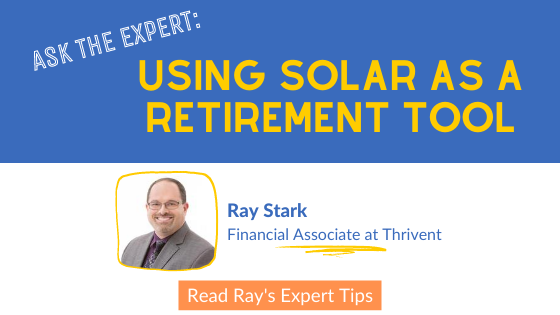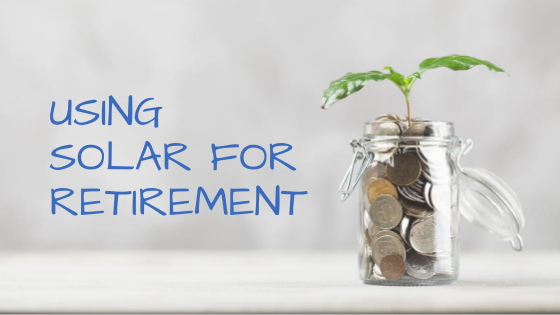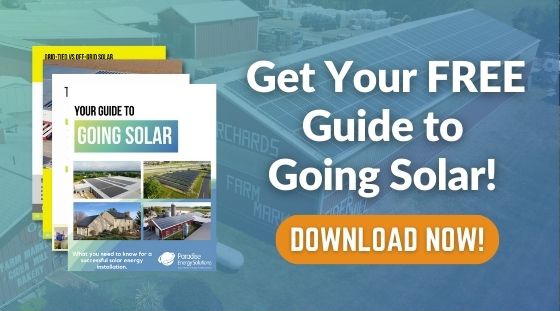To start, Paradise Energy Solutions is not a financial institution. While we are knowledgeable of the financial benefits of investing in solar energy, we are not experts in finance. Always consult a trusted financial advisor before investing in solar.
Diversifying your retirement plan is important to reduce financial risks, and many don’t realize solar power can be a low-risk option. The perfect retirement looks different for everyone, but one fact remains the same: when you stop working, you’ll need to have something to fall back on.
A well-planned retirement strategy begins by looking at your needs, wants and dreams for the future. Your retirement is unique, so consider working with a financial professional to help you develop a comprehensive strategy that accounts for your specific goals.
Trust the Experts

When we think of retirement investments, we think of stock-backed IRAs and 401K accounts from our employer, not necessarily a solar system. However, solar energy can offer huge financial benefits to those who choose to invest - both now and later.
Our trusted friend and financial associate at Thrivent, Ray Stark, helped us answer some of the most frequent questions our clients ask concerning their future returns on investing in solar energy.
Investing wisely before 65 can do wonders for your retirement account. However, there are so many options when it comes to investing your money. It can be hard to know which is the right one.
Reducing Future Expenses
One approach to retirement is to reduce the money you’ll have to spend each month, like moving to an area with a lower cost of living or downsizing your home.
If you install a solar system, you could drastically reduce your electric bill for at least 25 years. Depending on how much electricity you use, this could save you hundreds of dollars each month.
But installing solar isn’t exactly free. You’ll still have to pay for the equipment and installation labor. The good news is solar systems last more than long enough to pay for themselves with the electricity savings they generate, while still leaving years of free electricity.
Most solar panels are guaranteed for 25 to 30 years by their manufacturer, and inverters are typically under warranty for 12 to 25 years. While your system can certainly outlast the warranties, that still leaves plenty of time to enjoy free electricity.
In addition to reducing your electric bill, you’ll be protecting yourself against future increases in electricity costs. Keep in mind, your electric bill now is probably less than what your electric bill will be in 20 or so years. Between 2005 and 2015, electricity prices increased by 34%.
With solar energy, the amount you pay per kilowatt-hour stays the same: $0. As electric rates increase, so will the amount of money your solar system will save you.
Rays Stark Says…
Individuals may be interested in this option if it means decreasing some expenses in retirement. Solar energy may provide an avenue where they can decrease their utility costs in retirement by purchasing a solar energy system prior to retiring. This would be a similar concept to paying off your home before you retire so that your expenses would be lower in your retirement years.
Financial Benefits Now and Later
One of the unique things about a solar investment is that it has both an up-front and long-term payoff, so you can feel the benefits now and when you retire.
If you pay taxes and own your solar system, you’ll get 30% of the system’s cost back in year one through the federal government’s solar investment tax credit . If you’re installing solar for a farm or a business, you’ll also be eligible for accelerated depreciation, meaning more money back in your pocket the first year.
On top of that, you could be saving thousands each year by dramatically reducing your electric bill over the entire life of the system. That’s money you can put towards something much more exciting than electricity. And as an added bonus, the return from your solar system isn’t taxable, unlike other common retirement investments.
But the benefits of solar energy don’t stop there. If you live in a state where you can sell your solar renewable energy certificates (SRECs) you can generate even more income from your system. SRECs are awarded for every 1 megawatt-hour (or 1,000 kilowatt-hours) your system generates. You can then sell this on the SREC market for additional revenue.
Ray Stark Says…
A solar energy solution may provide a possible tax break. This tax break could offset taxes owed by having to take RMDs (required minimum distributions) from retirement accounts. Be sure to work with your tax advisor to learn more about the possible benefits.
Stability of Solar Investment
One of the biggest benefits solar energy has over other retirement investments is its stability.
You’re not beholden to the whims of the stock market or the general uncertainty that comes with investing your money.
With solar energy, you’re not making a bet on what other people can do or how hard they work. The return on your investment is based on three things: that you’ll keep using electricity, the price you pay for electricity will continue to get more expensive, and the sun will rise every morning. Those are pretty safe bets.
That’s why investing in solar energy is one of the smartest investments you can make during unstable, and stable, times.
Ray Stark Says…
With people living longer today compared to previous generations, you should prepare for the possibility that the system may need to be repaired or replaced in your later years. Although most systems come with a long warranty, there is still the potential of “outliving” the system. A sound financial strategy will have to account for this.
Solar Increases the Value of Your Home
When you’re planning for retirement, you need to look at net worth. That means factoring in all your assets and liabilities, even ones that aren’t liquid, like real estate.
Installing a solar system at your property raises its value, so you’ll get more for your building when you go to sell it than if you hadn’t installed solar panels.
To be fair, this increase in your home’s value may also come with a higher insurance payment. But this increase should be factored into the payback and return on investment (ROI) of your solar system on the solar proposal or estimate you receive from your installers.
Ray Stark Says…
Another positive benefit might be the potential impact on the value of the property and the resale appeal of the home when it’s ready to be sold in the future. However, it’s important to note that real estate markets vary greatly and what may be considered desirable in one area might not be desirable in another.
How the ROI of Solar Compares to Other Investments
While investing in solar energy offers a good number of benefits, it’s important to understand how hard your money is working for you. As with any investment, understanding the opportunity cost is key to making the most of your money.
To help quantify this, we’ll take a look at the ROIs of common retirement investments and how they compare to solar energy.
Solar Energy
The ROI of your solar system will depend on how much electricity you use, and how much electricity your solar system produces. The more electricity you use, the more money you stand to save with solar, and the higher your ROI will be.
In 2022, the ROI for an average-sized residential system was around 6.25% range with a payback in roughly 13 years.
Stock Market
Most financial advisors look for a 7% ROI on stock-heavy retirement plans for their clients. The chances that your account actually gains that return is dependent on luck and how long you leave your money invested. The Motley Fool does a great job explaining why this is.
Essentially, the best way to get around the volatility of the stock market is by holding on to your stocks for several years. The longer you have your stocks, the more likely you’ll be able to cash out at 7%. The less time you have, the more likely it is you’ll have to cash out during a downward period for the market, which could mean a significant loss.
Bonds
Bonds may be a little less risky than the stock market, but they will offer a lower return. From 1926 to 2018, the average bond yielded a 5.3% ROI. If you’re willing to invest in more risky bonds, your return could be higher. If you want to play it safe, you can count on being on the lower side of average.
Real Estate
Who doesn’t love a good fixer-upper reality show? A team buys a dirt-cheap, rundown property, puts in a whole lot of elbow grease, and flips the property to a new buyer for way more than they paid.
Or, some investors opt to be landlords, renting out the property that they own and gaining money that way.
Real estate investments can be smart financial moves, or they can flop, leaving you with a property no one wants and a big hole in your wallet.
Mashvisor.com states that the average return for a residential real estate investment is 10.6%, and the average return for a commercial property is 9.6%. You could even increase the value of your property by installing a solar system. Because what buyer wouldn’t prefer a building that has a tiny electric bill over a standard electric bill?
But the downside is that flipping properties takes a lot of work, talent, and money, and you could be sitting on the property for months or longer before finding the right buyer. If you invest in solar energy, however, you’ll start seeing payback within the first year of your system.
Ray Stark Says…
Sit down with a financial professional to discuss the possibility of including solar as part of your financial strategy, including your retirement. A financial professional can help you determine if solar is a good fit based on your goals and objectives. They may also be able to help you determine whether the time is right to purchase the system. For example, they may ask you if you’re planning to move to another home in retirement or if you’ll stay in your current home (and if so, for how long).
Is Solar Investment Right For You?
There’s a lot to consider when choosing where to put the money you have saved for retirement. It all comes down to how much money you have, the years you have until retirement, and your risk tolerance. Diversity is a good way to control the risk inherent in investing.
However, an investment in solar energy is relatively low risk, meaning you can just about bank on free electricity for the first 25 to 30 years (at least) of your system’s lifespan. A solar investment can be a great complement to your retirement plan.
To see what a solar investment could look like for you, use our free solar savings calculator. You’ll get an instant estimate of your ROI, payback, and tax savings.
Ready for a quote? Paradise Energy Solutions will provide you with detailed information about the financial return for a system that fits your needs. This is perfect information to review with your financial advisor.
About Thrivent
Thrivent is a diversified financial services organization that helps people achieve financial clarity, enabling lives full of meaning and gratitude. As a mission-driven, membership-owned organization, it offers its more than 2 million members and customers a broad range of financial products, services and guidance. Thrivent and its subsidiary and affiliate companies offer insurance, investments, banking and advice over the phone, online as well as through financial professionals and independent agents nationwide. Thrivent is a Fortune 500 company with $152 billion in assets under management/advisement (as of 12/31/19). Thrivent carries an A++ (Superior) rating from AM Best, a credit rating agency; this is the highest of the agency’s 16 ratings categories and was affirmed in May of 2020. For more information, visit Thrivent.com. You can also find us on Facebook and Twitter.
Thrivent is the marketing name for Thrivent Financial for Lutherans. Insurance products issued by Thrivent. Not available in all states. Securities and investment advisory services offered through Thrivent Investment Management Inc., a registered investment adviser, member FINRA and SIPC, and a subsidiary of Thrivent. Licensed agent/producer of Thrivent. Registered representative of Thrivent Investment Management, Inc. Advisory services available through investment adviser representatives only. Thrivent.com/disclosures.
If you have more questions for Ray, connect with him on Facebook or Linkedin.
To take a look at what a solar investment could look like for you, use the button below to request a custom quote. We will provide you with detailed information about the financial return for a system that fits your needs. This is perfect information to review with your financial advisor.



